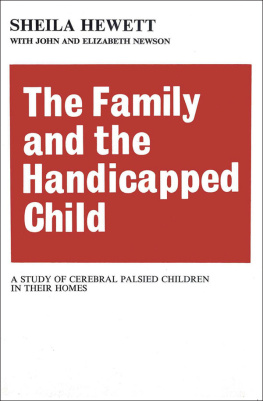ROUTLEDGE LIBRARY EDITIONS: CHILDREN AND DISABILITY
Volume 12
CARING FOR THE MENTALLY HANDICAPPED CHILD
CARING FOR THE MENTALLY HANDICAPPED CHILD
DAVID WILKIN
First published in 1979 by Croom Helm Ltd
This edition first published in 2016
by Routledge
2 Park Square, Milton Park, Abingdon, Oxon OX14 4RN
and by Routledge
711 Third Avenue, New York, NY 10017
Routledge is an imprint of the Taylor & Francis Group, an informa business
1979 Crown
All rights reserved. No part of this book may be reprinted or reproduced or utilised in any form or by any electronic, mechanical, or other means, now known or hereafter invented, including photocopying and recording, or in any information storage or retrieval system, without permission in writing from the publishers.
Trademark notice: Product or corporate names may be trademarks or registered trademarks, and are used only for identification and explanation without intent to infringe.
British Library Cataloguing in Publication Data
A catalogue record for this book is available from the British Library
ISBN: 978-1-138-96230-9 (Set)
ISBN: 978-1-315-64761-6 (Set) (ebk)
ISBN: 978-1-138-12493-6 (Volume 12) (hbk)
ISBN: 978-1-138-12494-3 (Volume 12) (pbk)
ISBN: 978-1-315-64786-9 (Volume 12) (ebk)
Publishers Note
The publisher has gone to great lengths to ensure the quality of this reprint but points out that some imperfections in the original copies may be apparent.
Disclaimer
The publisher has made every effort to trace copyright holders and would welcome correspondence from those they have been unable to trace.
The publishers would like to make it clear that the views and opinions expressed, and language used in the book are the authors own and a reflection of the times in which it was published. No offence is intended in this edition.
CARING FOR THE MENTALLY HANDICAPPED CHILD
DAVID WILKIN
1979 Crown
Croom Helm Ltd, 2-10 St Johns Road, London SW11
ISBN 0-85664-648-2
British Library Cataloguing in Publication Data
Wilkin, David
Caring for the mentally handicapped child.
1. Mentally handicapped children care and treatment Great Britain
I. Title
362.7830941 HV901.G7
ISBN 0-85664-648-2
Printed in Great Britain by
Biddles Ltd, Guildford, Surrey
CONTENTS
The research on which this book is based was conducted for and funded by the Department of Health and Social Security between 1973 and 1976. It is now three years since the field work was completed. There have undoubtedly been some improvements in services for severely mentally handicapped children and their families in the intervening period, but these have not, unfortunately, removed some of the most pressing problems which beset mothers of such children. Whilst this book is often highly critical of those people who provide services to families it is recognised that they work under difficult conditions. They are constrained by a severe lack of resources and often by a lack of imaginative leadership from above. Changes in the knowledge and attitudes of those who actually provide services are necessary, but these will be ineffectual unless accompanied by increased resources, imaginative planning and effective leadership. I hope, therefore, that this book will be read by a wide audience, since it is addressed to anyone who is concerned for the welfare of the severely mentally handicapped and those who care for them.
The book is principally about mothers of severely mentally handicapped children rather than families or the children themselves. Community care of such children relies on the fact that these mothers are prepared to tolerate a burden which most people would consider intolerable. The study described here was only possible because the mothers were prepared to give up some of their valuable spare time to answer the questions put to them by myself and the other interviewers (Hilary Gellman, Joyce Goldstone and Cath Prior). I would like to express my thanks to them and I hope that the publication of the findings of this research will add some weight to efforts to obtain better services for them and for future generations of mothers of severely mentally handicapped children.
Whilst the views expressed in the following chapters are my own, I would like to thank Joyce Leeson and Karin Lowson for their hard work in providing many valuable comments, criticisms and suggestions at all stages of the preparation of the manuscript. I would also like to thank Professor Alwyn Smith who supervised the PhD thesis on which this book is based. Most books only reach completion through the goodwill and hard work of typists, and this is no exception. I am very grateful for the patience of Leila Britten who typed the manuscript and to Lee Skimore who typed the original thesis.
David Wilkin
September 1978
To many who are unfamiliar with the condition, the mentally handicapped are incomprehensible, at times frightening and usually best forgotten. To those who spend every day of their lives with a mentally handicapped person it is the attitudes of other people which are incomprehensible, at times frightening and usually best forgotten. Thousands of parents can describe the pleasures, as well as the trials and tribulations, of family life with a severely mentally handicapped person to anyone who is prepared to listen and take an interest. It is unfortunate that even today many people know little about the mentally handicapped, although the last 50 years have seen some signs of progress in attitudes, at least in professional and governmental circles. It is no longer considered necessary that society should be protected from the mentally handicapped, but in spite of improvements in attitudes, and associated improvements in services, the mentally handicapped themselves and their families still face many problems. There is still a pressing need for increased understanding and for further improvements in attitudes and services beyond those that have already taken place.
This book is concerned with the problems experienced by families caring for children who were suffering from severe mental handicap, which has been described as a diverse condition which stems from an assortment of aetiological sources, covers a wide range of functional impairment and is attended by extremely varied social problems and issues.two main approaches to the definition of mental handicap can be distinguished; namely the medical/psychological approach and the sociological approach, and these will be briefly reviewed in this chapter. Following this the size of the problem, in terms of the numbers of mentally handicapped people will be considered. A number of studies in this country have estimated the prevalence of mental handicap and these will be briefly reviewed. Although this book focuses on the care and support provided by society for these people and their families, the present situation cannot be understood unless seen in historical perspective. Their present position is a product of the historical development of attitudes and services, and therefore this development will be summarised before briefly describing current government policies and the structure of the services. The chapter concludes with a discussion of some of the problems which will need to be overcome if society is to provide adequate services.











